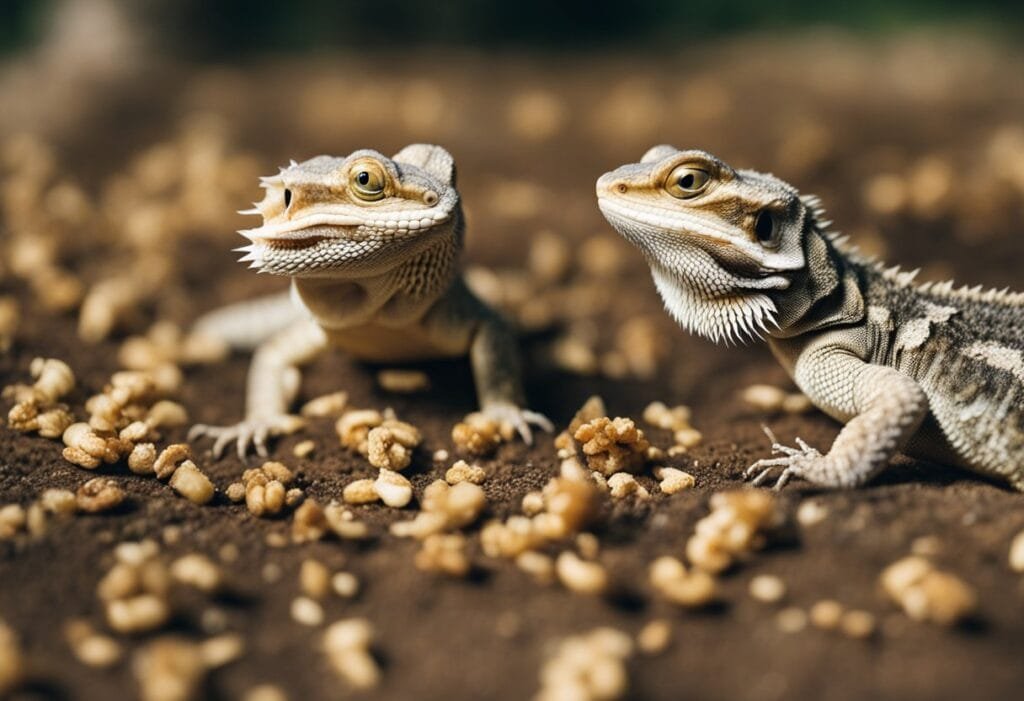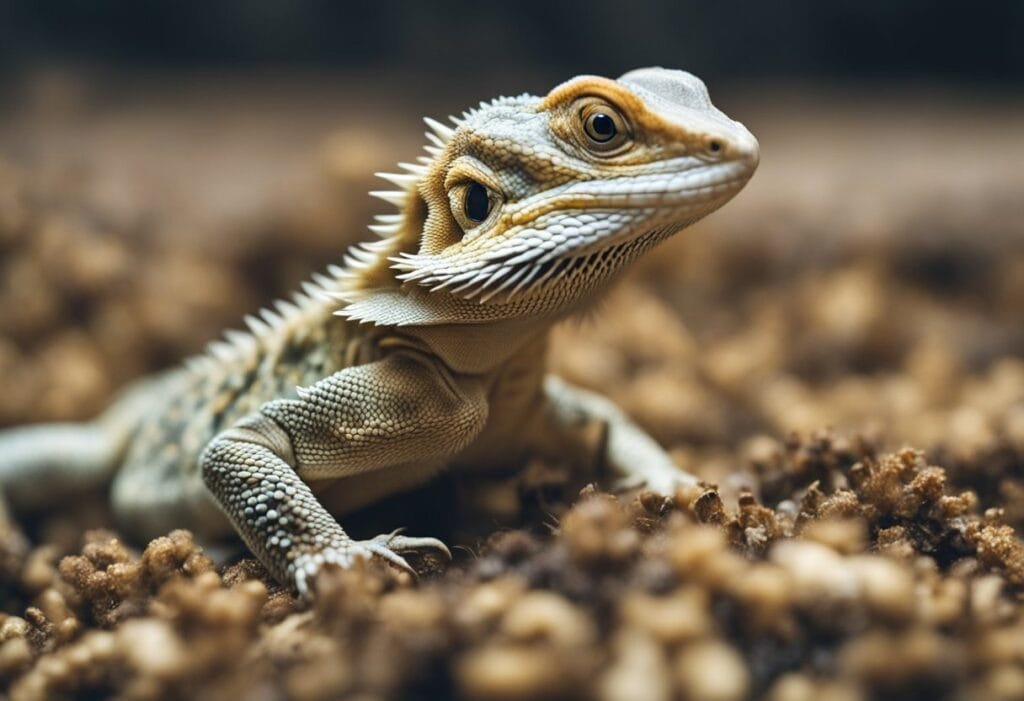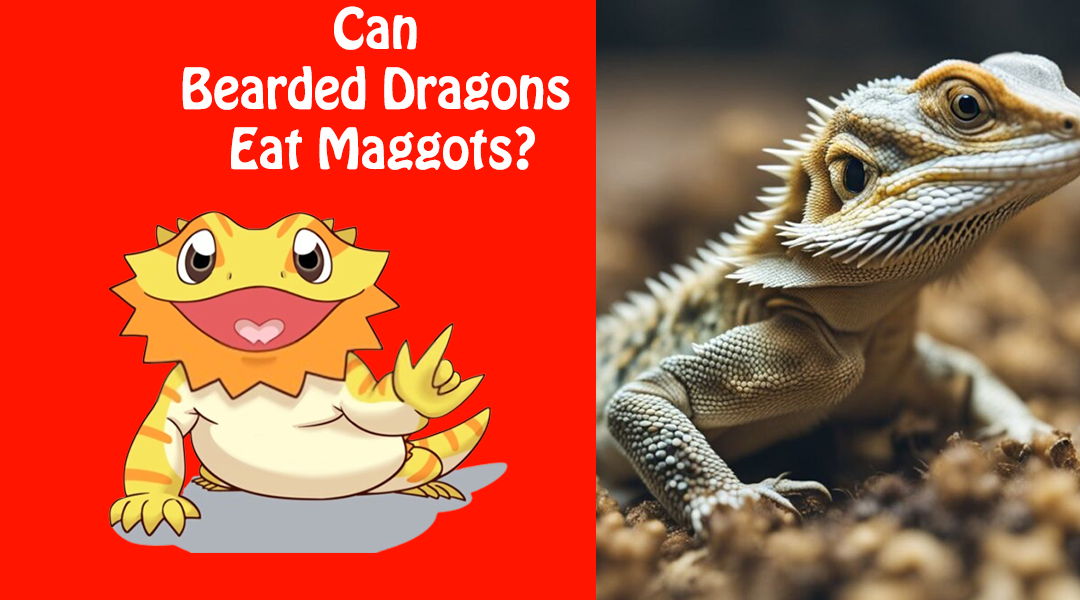Bearded dragons are omnivorous reptiles that require a balanced diet of both animal and plant-based foods. While there are many commercially available foods and treats for bearded dragons, some owners may wonder if they can offer their pets maggots as a source of protein. In this article, we will explore whether bearded dragons can eat maggots and the potential benefits and risks associated with this food.

Maggots are the larval stage of flies and are often used as a food source for reptiles and other animals. They are high in protein and fat, making them a nutritious option for bearded dragons. However, it is important to consider the source of the maggots and whether they have been properly prepared before feeding them to your pet. In the following paragraphs, we will delve into the specifics of feeding maggots to bearded dragons and provide guidance on how to do so safely.
Overview of Bearded Dragon Diet
As reptiles, bearded dragons have specific dietary requirements to ensure they stay healthy. A balanced diet is crucial to keeping your pet happy and healthy.
In the wild, bearded dragons are omnivores, meaning they eat both plants and animals. Their diet consists of insects, such as crickets, mealworms, and roaches, as well as leafy greens and vegetables.
When it comes to feeding your bearded dragon, it’s important to provide a variety of foods to ensure they get all the necessary nutrients. A diet that consists of only one or two types of food can lead to health problems, such as malnutrition and obesity.
It’s also important to consider the size and age of your bearded dragon when feeding them. Juvenile bearded dragons require more protein and calcium than adults, while adult bearded dragons require more vegetables and fiber.
In addition to their regular diet, bearded dragons also require a source of hydration. They can obtain water from their food, but it’s important to provide a water dish for them to drink from as well.
Overall, providing a balanced and varied diet is essential for the health and wellbeing of your bearded dragon.
Understanding Maggots

Maggots are the larvae of flies, and they are often used as a food source for reptiles, including bearded dragons. Maggots are high in protein and fat, making them a nutritious treat for these lizards.
It’s important to note that not all maggots are safe for bearded dragons to eat. Some maggots, such as those that come from carrion or decaying meat, can carry harmful bacteria that can make your pet sick. It’s important to only feed your bearded dragon maggots that are specifically bred for reptile food.
When feeding your bearded dragon maggots, it’s important to ensure that they are fresh and healthy. Maggots that are dead or decaying can also carry harmful bacteria and should be avoided. Additionally, it’s important to feed your bearded dragon maggots in moderation, as they are high in fat and can lead to obesity if overfed.
In summary, maggots can be a nutritious treat for bearded dragons when fed in moderation and from a trusted source. It’s important to understand the potential risks associated with feeding your pet maggots and to take appropriate precautions to ensure their safety and health.
Potential Health Risks
When it comes to feeding bearded dragons maggots, there are some potential health risks that need to be considered. While maggots can be a good source of protein for bearded dragons, they can also carry harmful bacteria and parasites that can make your pet sick.
One of the biggest concerns with feeding bearded dragons maggots is the risk of bacterial contamination. Maggots can carry bacteria such as Salmonella, which can cause serious illness in both humans and animals. If a bearded dragon ingests contaminated maggots, they can become sick and may require medical attention.
Another potential health risk associated with feeding bearded dragons maggots is the risk of parasitic infection. Maggots can carry parasites such as tapeworms and roundworms, which can infect your pet if they ingest infected maggots. These parasites can cause a range of health problems, including digestive issues, weight loss, and lethargy.
It’s also important to note that not all types of maggots are safe for bearded dragons to eat. Some maggots, such as blowfly larvae, can be toxic and should be avoided. If you’re considering feeding your bearded dragon maggots, it’s important to do your research and make sure you’re feeding them a safe and nutritious diet.
Overall, while maggots can be a good source of protein for bearded dragons, there are some potential health risks that need to be considered. It’s important to take precautions to ensure that your pet stays healthy and happy.
Nutritional Value of Maggots
Maggots are the larval stage of flies and are often used as a food source for reptiles. They are a good source of protein and other essential nutrients that can benefit the health of bearded dragons.
Maggots are high in protein, which is essential for muscle growth and repair. They also contain fat, which is a good source of energy for bearded dragons. In addition, maggots are rich in vitamins and minerals, such as calcium, phosphorus, and potassium, which are important for maintaining healthy bones, teeth, and muscles.
One of the benefits of feeding bearded dragons maggots is that they are easy to digest. This is because maggots have a soft exoskeleton, which makes them easier to break down and absorb. As a result, bearded dragons can quickly and efficiently extract the nutrients they need from maggots.
However, it is important to note that maggots should not be the sole source of nutrition for bearded dragons. While they are a good source of protein and other essential nutrients, they do not contain all of the vitamins and minerals that bearded dragons need to stay healthy. Therefore, it is important to include a variety of other foods in their diet, such as fruits, vegetables, and other protein sources.
Overall, maggots can be a nutritious addition to a bearded dragon’s diet, but they should be fed in moderation and as part of a balanced diet.
Feeding Process
When feeding bearded dragons, it is important to provide them with a balanced diet that includes a variety of protein sources. While maggots can be a good source of protein for bearded dragons, it is important to be cautious when feeding them to your pet.
First, it is important to ensure that the maggots are from a safe and reliable source. Feeding your bearded dragon wild maggots can be dangerous, as they may contain harmful bacteria or parasites. It is recommended to purchase maggots from a reputable pet store or breeder.
When feeding maggots to your bearded dragon, it is important to ensure that they are properly prepared. Maggots should be gut-loaded with nutritious foods like vegetables and fruits before being fed to your pet. They should also be dusted with a calcium supplement to ensure that your bearded dragon is getting the necessary nutrients.
It is also important to monitor your bearded dragon’s consumption of maggots. While they can be a good source of protein, too many maggots can lead to digestive issues. It is recommended to feed maggots as a treat, rather than a staple in your bearded dragon’s diet.
Overall, feeding maggots to your bearded dragon can be a safe and nutritious option when done properly. As with any new food, it is important to introduce maggots slowly and monitor your pet’s reaction.
Alternative Insect Options

If you’re looking for alternative insect options to feed your bearded dragon, there are a few other options to consider. Here are some of the most popular choices:
Crickets
Crickets are a staple food for many reptiles, including bearded dragons. They are readily available at most pet stores and are relatively easy to keep alive. Be sure to gut-load your crickets with nutritious food before feeding them to your bearded dragon.
Dubia Roaches
Dubia roaches are another popular choice for bearded dragon owners. They are high in protein and have a soft exoskeleton, making them easy to digest. They are also less likely to carry parasites than crickets.
Mealworms
Mealworms are a good option for bearded dragons that are picky eaters. They are easy to find at most pet stores and can be kept alive for a long time. However, they are not as nutritious as other insects and should be fed in moderation.
Superworms
Superworms are larger than mealworms and are a good source of protein for bearded dragons. They are also easy to find at most pet stores and can be kept alive for a long time. However, they are not as nutritious as other insects and should be fed in moderation.
Overall, there are several alternative insect options to consider when feeding your bearded dragon. It’s important to provide a varied diet to ensure that your pet is getting all of the necessary nutrients.
Conclusion
In conclusion, while bearded dragons can technically eat maggots as a source of protein, it is not recommended as a regular part of their diet. Maggots can carry harmful bacteria and parasites, and may not provide a balanced nutritional profile for bearded dragons.
It is important to note that bearded dragons are primarily insectivores and require a varied diet of insects, vegetables, and fruits to stay healthy. While maggots may be an occasional treat, they should not make up a significant portion of a bearded dragon’s diet.
If you do decide to feed your bearded dragon maggots, it is important to ensure that they are from a reputable source and have been properly cleaned and prepared. As with any new food, introduce maggots slowly and monitor your bearded dragon for any adverse reactions.
Overall, while bearded dragons may be able to eat maggots, it is best to stick to a well-rounded diet of insects, vegetables, and fruits to ensure their health and well-being.
Frequently Asked Questions

Are maggots a safe food for bearded dragons?
Maggots are a safe food for bearded dragons when they are properly raised and fed. However, it is important to ensure that the maggots are free from any harmful bacteria or parasites before feeding them to your bearded dragon.
Can bearded dragons safely consume house fly maggots?
Yes, bearded dragons can safely consume house fly maggots as long as they are properly raised and fed. However, it is important to avoid feeding your bearded dragon wild-caught maggots, as they may contain harmful bacteria or parasites.
What insects should bearded dragons avoid eating?
Bearded dragons should avoid eating insects that are high in fat, such as mealworms and superworms. They should also avoid eating insects that are toxic, such as fireflies. Additionally, bearded dragons should not be fed wild-caught insects, as they may contain harmful bacteria or parasites.
Is it safe for bearded dragons to eat fly larvae?
Yes, bearded dragons can safely eat fly larvae, including house fly maggots. However, it is important to ensure that the larvae are properly raised and fed to avoid any potential health risks.
Are dead flies a suitable food for bearded dragons?
No, dead flies are not a suitable food for bearded dragons. Dead insects can quickly become contaminated with harmful bacteria, which can make your bearded dragon sick. It is best to feed your bearded dragon live insects or freshly-killed insects.
Can lizards safely consume maggots?
Yes, many species of lizards, including bearded dragons, can safely consume maggots as part of their diet. However, it is important to ensure that the maggots are free from any harmful bacteria or parasites before feeding them to your lizard.
I, Mark Antonelli am highly interested in pet care tips. The experiences I gained through university life in animal sciences were also helpful to identify the best tricks for caring for and feeding varying kinds of pets. I know the majority of people love to own a pet. Yet, there is a guilty of owing a Bearded Dragon due to a lack of information about how much friendly and peaceful they are. I thought of filling this gap with detailed writings about this Pogona genus Bearded Dragon. All my team is also giving me great support to fulfil my mission. Hope you will enjoy the journey with us.

